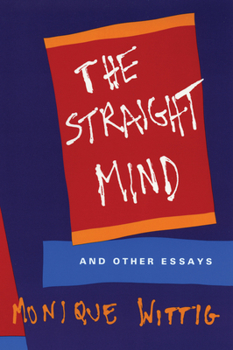Book Overview
These political, philosophical, and literary essays mark the first collection of theoretical writing from the acclaimed novelist and French feminist writer Monique Wittig. This description may be from another edition of this product.
Format:Paperback
Language:English
ISBN:0807079170
ISBN13:9780807079171
Release Date:February 1992
Publisher:Beacon Press
Length:132 Pages
Weight:0.75 lbs.
Dimensions:0.3" x 5.5" x 8.4"
Customer Reviews
2 ratings
A Classic
Published by Thriftbooks.com User , 15 years ago
Wittig, Monique. "The Straight Mind", Beacon, 1992. A Classic Amos Lassen Monique Wittig is one of my heroines. When I was a graduate student studying feminist literary criticism, her book "The Straight Mind" was indispensable to me. She is a mainstay in the French Feminist movement and is probably the major theorist of radical lesbianism. "The Straight Mind" is a collection of nine of her essays that deal with the politics of gender and her position is profound--she says, "There is no sex...but sex that is oppressed and sex that oppresses". She eschews and resists biological determinism and existentialism and she maintains that sex is a construct that is social and ideological. She is a methodical and aggressive writer and even though this makes her dense and combative, she is extremely readable. She excels with her literary essays as she expounds on the relationship between ideology and literary form. Her literary essays, however, are political to a degree. Perhaps some people have trouble with Wittig because it is a work in translation but there is a lot here to get a person thinking. Wittig maintains that the first half of the book concerns materialist lesbianism and the second half is about writing--about how language is dominated by heterosexuality. The nine essays make up a thoughtful approach to the study of dialectics, historical materialism and also deal with philosophy, literary theory and politics. She looks at men and women as distinct classes and that the term "woman" was socially constructed and used to bring around certain images. She claims that all oppression is economic and sexism occurs in societies where all people have equal economic opportunities. With the transformation of thought processes and our language, society will be transformed and there will be no dominant and no dominated. This is to say that there will no longer be men and women and classes and categories of thought and language will disappear completely. Wittig, in essence, gives a new definition to feminism. This is a brilliant study and whether we agree or not, Wittig certainly gives us a great deal to think about.
Gem from a brilliant thinker.
Published by Thriftbooks.com User , 19 years ago
This book will forever redefine feminism for its readers. There are two threads: one political, the other literary commentary. Fortunately, Witting pulls the former into the latter. The astute and radical political critique in Wittig's book is uniquely powerful. Wittig addresses the question of how a movement is comprised of both group energy and individual experience. The theory, legacy, and limits of Marx and Engels are discussed. Then, drawing on de Beauvoir and other iconoclasts, Wittig addresses our dominator culture in a way that goes directly to its core. Wittig deals efficiently yet persuasively with the argument over whether nature or culture is responsible for inequality, declaring that "there is no sex." This statement becomes the book's alpha and omega, and the lens through which Wittig shows us history, literature, and the future of activism.Like whiteness, maleness is a social category that can be renounced. Man (Homo) once meant everybody in the human community -- it was indeed generic, in the unifying sense. Unfortunately, the word has so frequently been used to describe a socially constructed group that expels half of itself in order to oppress it, "man" is now identified with those identified as male. In the essay "The Category of Sex" Wittig writes: "The perenniality of the sexes and the perenniality of slaves and masters proceed from the same belief, and, as there are no slaves without masters, there are no women without men. The ideology of sexual difference functions as censorship in our culture by masking, on the grounds of nature, the social opposition between man and women. Masculine/feminine, male/female are the categories which serve to conceal the fact that social differences always belong to an economic, political, ideological order. ...The masters explain and justify the established divisions as a result of natural differences." I understand that Wittig has recently passed away. If only I had discovered this book a little earlier, so that I could have met the author. That feeling, I suppose, is the sign of a truly good read. "A text by a minority author is only successful if it succeeds in making the minority point of view unviersal" writes Wittig --and to read this book from beginning to end is to find that the author has done just that.




